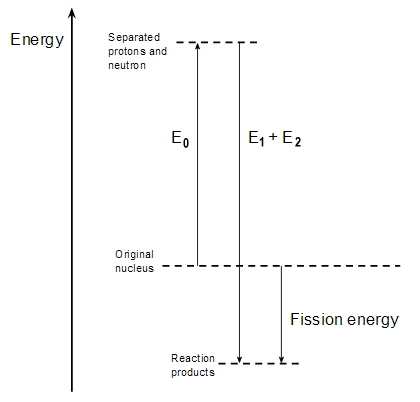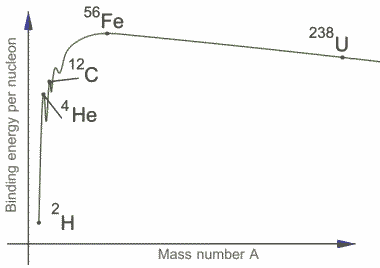In nuclear fission the total rest mass of the products is less than the mass of the original nucleus. But on the other hand, the binding energy of the products is higher. Doesn't the decrease of the rest mass of the products contribute to the increase of their binding energy? So why then there is enormous energy released?
3 Answers
There's a closely related question: binding energy of a nucleus is positive?
Imagine taking the nucleus and pulling it apart into individual protons and neutrons. To do this you have to put in energy, and the amount of energy you put in is equal to the binding energy - call this $E_0$. Now let the individual protons and neutrons come together again to form the daughter nuclei (and free neutrons). As the question I linked explains, to form the daughter nuclei you have to take energy out, and the amount of energy you take out is the sum of the binding energies of the two daughter nuclei - call these $E_1$ and $E_2$.

When you say the binding energy of the products is higher what this means is:
$$ E_0 < E_1 + E_2 $$
So in our notional process of pulling the nucleus apart and letting it reform, we end up getting energy out i.e. the fission process produces energy (typically as kinetic energy of the reaction products).
As for the masses, when we separated the original nucleus we had to add an energy $E_0$, so the mass of the separated nucleons is more than the original nucleus by an amount $E_0/c^2$. When we let the nucleons recombine into the daughter nuclei we get energy out so the mass of the products is less than the separated nucleons by an amount $(E_1 + E_2)/c^2$. Because $E_1 + E_2 > E_0$ overall the mass has decreased giving us the mass deficit. The mass deficit is just the amount of energy released in fission divided by $c^2$.
-
$\begingroup$ John, there is a new user who does not have the reputation to comment who is asking details about your diagram. physics.stackexchange.com/questions/170996/… $\endgroup$– anna vCommented Mar 19, 2015 at 9:03
It seems to me that you have a misconception of binding energy. If it is higher, it does not mean that there is more energy into the system, but that you need to put more energy into the system to separate the components. When the system (nuclear, chemical or even a ball on the edge of a bowl) releases some energy it drops into a more bound state, that is all.
-
$\begingroup$ But isn't it that the higher the binding energy the less rest mass you have? That is, we lose some mass in order to have a stronger binding of two things. $\endgroup$ Commented Feb 24, 2014 at 12:26
-
$\begingroup$ @user41216 definitely, the point is that the binding energy is not a kind of energy into the system, but is the energy (or the mass) that the system looses while binding. The less energy you have in the system the more it is stable: compare a bottle of gasoline with one of water! If you want to be able to release some energy you need a system that can be rearranged into a more stable state. $\endgroup$– DarioPCommented Feb 24, 2014 at 12:52
-
$\begingroup$ But when two nucleons form a nuclei, it's rest mass is smaller than the sum of the rest masses of its components. Hence, some of the energy due to the mass has been converted to the binding energy. Am I wrong? Then in fission we have smaller rest mass of products but higher binding energy. Isn't it due to the fact that component's rest masses were converted to binding energy? $\endgroup$ Commented Feb 24, 2014 at 16:53
-
$\begingroup$ It depends on which side of this curve upload.wikimedia.org/wikipedia/commons/5/53/… you are. Moving towards 56Fe the mass per nucleon goes down by the same amount of energy that is emitted. In heaviest nuclei particles that want to leave are present, when they do they take away some energy (the one that we use) and the system become more stable. I don't know what to say more to make this clearer, maybe you can wait for another answer. $\endgroup$– DarioPCommented Feb 24, 2014 at 17:07
I am an A-Level physics student. While revising I had the same question and after reading the other answers and lots of thinking I´ve come to a conclusion. Probably you as I did are thinking that binding energy is the energy used to sustain the bonds in a nucleus but it is not. Rather binding energy is an indicator of how efficient the bonds within a nucleus are, as there can be really strong bonds that require little energy. Atoms with a higher binding energy are more stable and therefore require less energy to form, allowing them to emit it. This is very well shown by the graph posted by @John Rennie.
For example, when Uranium-235 undergoes fission into Barium and Krypton, the products have a higher binding energy that the initial Uranium because they are more stable and require less energy to form, so they emit that difference in binding energy. The mass deficit is not used in building stronger bonds as it is essentially released because the bonds need less energy. Rather the mass deficit is simply a consequence of releasing the difference in binding energy.
This efficiency I am talking about has to do with how the atom is structured. As seen in the graph from hydrogen up to iron the binding energy per nucleon increases because you can fit protons and neutrons in a very compact manner which makes the strong nuclear force to increase faster than the electrostatic repulsion. However, in elements with a higher mass number than iron the electromagnetic force will begin to take over as the nucleus becomes too big for the strong force to be effective, thus reducing their binding energy (Fun fact: In heavy elements atoms have more neutrons than protons because this helps increase the distance between them, thus reducing the electrostatic repulsion). This results in many elements with a higher mass number than iron being radioactive because they are unstable and seek a better configuration. This is very well explained in this video: https://www.youtube.com/watch?v=mpDDQ4uEH6M
Hope this helps

